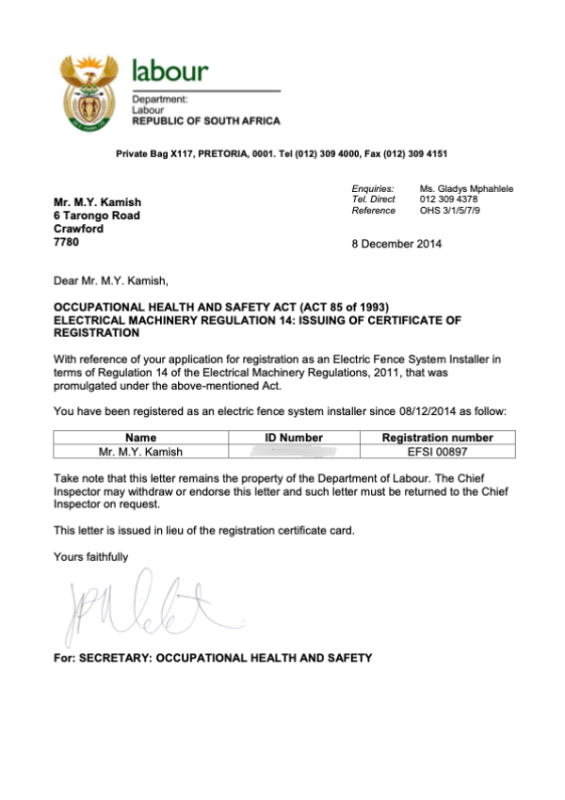COMPLIANCE AND SAFETY
⚡ Electric Fencing Compliance in South Africa
Electric fencing is a powerful security solution—but it comes with serious legal responsibilities. As of the latest updates to the SANS 10222-3:2023 Edition 5.1 regulations, homeowners and property managers must ensure their electric fence systems meet strict safety and compliance standards. Failure to do so can result in fines, insurance claim rejections, or even legal liability.

When Is a Certificate of Compliance (CoC) Required?
A Certificate of Compliance (CoC) is a legal document confirming that your electric fence installation meets South African National Standards. You’ll need a valid CoC in the following situations:
- Selling or transferring property: A CoC is mandatory for the sale to proceed.
- Insurance purposes: Many insurers require a CoC to approve claims or may offer reduced premiums for compliant systems.
- System upgrades or modifications: Any changes to your fence require a new CoC.
- Rental properties: Landlords must ensure compliance for tenant safety.
Without a CoC, you risk
- Legal liability if someone is injured—even an intruder.
- Insurance claim rejection for damage, theft, or injury.
- Delays or cancellations in property transactions.
⚠️ Legal Implications & Safety Risks
Electric fences are non-lethal by design, but improper installation can cause serious harm. If someone—whether a visitor, child, or trespasser—is injured due to a non-compliant fence, the property owner may face civil or criminal liability. That’s why compliance isn’t just about ticking boxes—it’s about protecting lives and livelihoods.
📏 Key Compliance Requirements
To meet the latest SANS regulations, your electric fence must include
Requirement | Details |
Fence Height | Wall-top fences must be mounted at least 1.5m above ground level |
Warning Signs | Must be placed at gates, corners, and every 10m in urban areas |
Lightning Diverters | Required to protect the system from electrical surges |
Earth Spikes | Installed every 30 meters for proper grounding |
Secure Energiser Housing | Must be weatherproof and safely located |
Safe Distance from Utilities | Must not interfere with power lines, water pipes, or public walkways |
Barrier Fencing | Required if the fence is freestanding and accessible to the public |
🔌 Energiser Testing & Certification
The energiser is the heart of your electric fence—and it must be tested and certified to comply with SANS 60335-2-76. Only energisers approved by internationally recognized labs may be used. Faulty or uncertified energisers can cause dangerous voltage spikes and invalidate your CoC.
👷 Installer Accreditation
Only installers registered with the Department of Labour are legally permitted to install or certify electric fencing systems. At EFI Electric Fence Installers, we are proud to be fully compliant and accredited, ensuring every installation meets the highest safety and legal standards.
✅ Why Choose EFI?
- Registered & Certified Installers
- CoC Issuance & Compliance Inspections
- Expert Knowledge of SANS Regulations
- Safe. Certified. Secure. Campaign Support
- Insurance-Friendly Installations
🛡️ Stay Safe. Stay Legal.
Whether you're upgrading your fence, selling your property, or simply want peace of mind, EFI Electric Fence Installers is here to help. We ensure your system is Safe. Certified. Secure.—because compliance isn’t optional, it’s essential.
